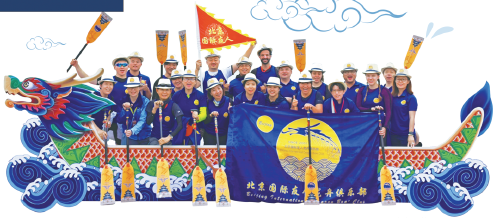Vessel for unity
China's ancient tradition of dragon boat racing offers its participants more than just a way to sweat, Chen Xue reports.
On Aug 3, 2021, a dragon boat race was performed as a demonstration sport at the Tokyo 2020 Olympic Games. The ten-minute showcase introduced the traditional Chinese sport to the rest of the world on the grand Olympic stage for the very first time, taking it one step closer to becoming listed as an Olympic sport.

But in fact, more than 20 years ago, He Ming was already doing his part to help introduce dragon boat racing to the world — starting with foreign expats living in China.
He, 52, founded the Beijing International Dragon Boat Club in 2001. "I thought, as the capital city of China, Beijing should play a more important role in promoting traditional Chinese cultural activities like dragon boat racing. And as an international metropolis, Beijing is also a good starting point to get more foreigners involved," said He.
Back in 2001, the internet wasn't yet a universal means for people to get information, so He got the word out by printing advertisements in English magazines. To his surprise, people soon started showing up, and he established his first team in 2002.
"I was impressed by how curious these foreigners were about Chinese culture. They were eager to learn and participate in the traditions of the land where they were staying," said He.
Dragon boat racing is very different from other Chinese sports that are popular among foreigners — sports like martial arts, which are usually done solo, not in a team. In dragon boat racing, everyone on board — the steersperson, the drummer, and all the paddlers — has to work together and stay in sync. According to He, it might be another reason that attracts people to the sport.
"Dragon boat racing is about teamwork, unity and friendship, not individualism," said He.
In the past 20 years, his club has attracted members from up to 30 countries from the world's six habitable continents — including Finland, Rwanda, Russia and Mexico. According to He, some team members are so committed that even after returning to their home countries, they still try to race for the team in international competitions overseas.
So far, the team has won two championships — at the Shenyang International Dragon Boat Open in 2007 and the Boracay International Dragon Boat Festival in the Philippines in 2015.
Getting good results is exciting, but to He, participation is most important. In the upcoming race in Beijing for the Dragon Boat Festival — which falls on June 22 this year — He is determined to give everyone on the team a chance to compete. As long as they register for the race, they will get a seat on the boat. No selection rounds are needed.
"Dragon boat racing is a very inclusive sport and it should be enjoyed by everyone," said He.

Friendships flow

Marianne Radu knew the story behind Chinese dragon boat racing even before she started doing the sport herself. Thanks to her mother, a China enthusiast from France, Radu took Chinese classes at school at age 14 and later at the Confucius Institute in Reims, France. It was in these classes that Radu learned the Chinese language — and Chinese folk stories.
Moving to Stuttgart, Germany, in 2022, Radu was surprised to find a dragon boat team there. And she joined it without hesitation.
Already adept at kayaking, Radu quickly picked up the techniques of dragon boat racing. And the ancient Chinese sport's differences with kayaking led to even more fascination.
"Kayaking is a pretty lonely sport. But with dragon boat racing, I've got to know so many new people," said the 21-year-old. "I love it when we row together because I know that everyone else is doing their best, which also brings out the best in me. I like the group energy."
She also enjoys telling her German teammates about the history of Chinese dragon boat racing. "I'm a big advocate of Chinese culture," said Radu. "And I think things like dragon boat racing are good starting points to introduce Chinese culture to German people."
Radu is now studying at the University of International Business and Economics in Beijing. In March, she joined the Beijing International Dragon Boat Team. After teaching so many others about Chinese culture, now she gets to be the "student" again, learning more about it from her many Chinese teammates.
For example, in their conversations, Radu picked up some Chinese expressions that she had never learned in textbooks. While dining together after their weekly training, her teammates would explain Chinese table manners to her. And last month when she went to Liaocheng, Shandong province, to compete in a race with the team, she got to see traditional Chinese dragon and lion dances at the opening ceremony.
"I have my team to thank for all these experiences," said Radu. "More clubs like this are needed when it comes to promoting cross-cultural exchange."
Meaning runs deep

Irene Di Maio, 24, came to Beijing in March from Italy to study for her master's degree at Capital Normal University. But it's not her first time in China — it's her fourth.
Di Maio first touched down in China in 2018 when she went to Xi'an, Shaanxi province, and then in 2019 for a trip to Suzhou, Jiangsu province — both to compete in dragon boat races representing Ca' Foscari University of Venice.
Di Maio left her hometown of Catania in southern Italy's Sicily to go to Ca' Foscari University of Venice in 2017.There, she started learning Chinese and joined the university's dragon boat team. She was quite surprised that the university had a team for a sport that is so uniquely Chinese.
"It probably has to do with Venetian's love for the water, with gondolas as their traditional form of transportation," said Di Maio.
According to Di Maio, the team would follow all the traditional Chinese rituals about dragon boat races, including repainting the eyes of the boat's dragon head before each race.
"All my Italian teammates found the rituals very intriguing," said Di Maio, although she doubted that they knew anything about the Chinese idiom hualongdianjing, which literally translates as adding the eyes when painting a dragon, and is used to express the idea of putting the final touches on something to make it perfect.
But Di Maio hopes to make some changes. She is now studying international Chinese education, with one of her future goals to help promote Chinese culture to the world. She also joined the Beijing International Dragon Boat Team shortly after arriving in Beijing and soon became friends with her Chinese teammates.
"Dragon boat racing is not just a sport, but a way to bring people together," said Di Maio. "Even when I was in Venice, where I was surrounded by my own compatriots, I still made most of my friends from the dragon boat team."
Ready for anything

When Li Xing was studying at Nanyang Technological University (NTU) in Singapore 18 years ago, she joined the school's dragon boat team.
"At first, it was just to get points for extracurricular activities," she said. "But after several years of training, I benefited not only physically but also mentally. I've developed greater perseverance and made some of my best friends through the team, who I still keep in touch with today."
Dragon boat racing has long been a popular activity in Singapore. Li took part in numerous races with her team every year — races among local universities as well as international competitions in Malaysia and Cambodia. She still remembers fondly the time in 2006, when both her university's men's and women's teams won the Prime Minister's Challenge Cup — one of the major races in the country — and Prime Minister Lee Hsien Loong himself presented the award to her and her team.
After 18 years of studying and working in Singapore, Li, 38, moved to Beijing in 2020 and now works as a math teacher at a bilingual primary school. Upon returning, she began to miss the thrill and excitement of dragon boat racing. So this year she joined the Beijing International Dragon Boat Team.
The diversity of teammates in terms of nationality, age and background makes the team quite different from the one Li was part of back at NTU. Some teammates are in their 20s and others are in their 60s. And Li can see that He Ming, the captain, tries to keep the training as professional and efficient as possible.
"We're not allowed to have casual conversations while in the water. Everything there has to be about the race. We're very much like a 'combat troop' ready to fight," Li joked.
Li thinks that having people from different cultural backgrounds participating in the same sport is a good way to promote Chinese tradition and history.
"It allows people from other parts of the world to better understand the tenacity and perseverance of Chinese people," she said.
Contact the writer at chenxue@i21st.cn

















